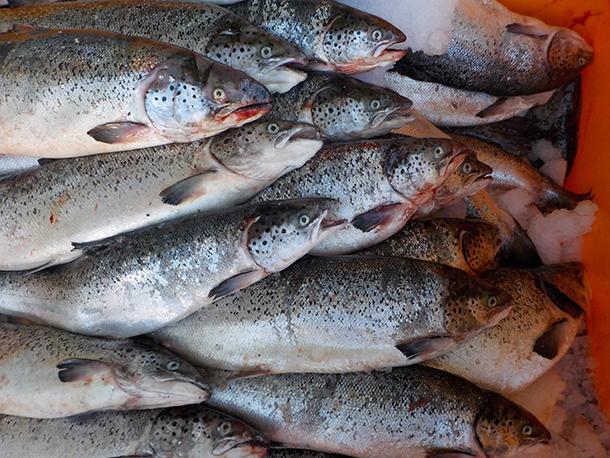Thousands of Atlantic salmon escape into Pacific Northwest waters
More than 160,000 Atlantic salmon escaped from a broken aquaculture pen off the coast of Cypress Island in the Puget Sound. These escapees were caught by local fishermen and await identification.
A catastrophic failure of a large aquaculture pen near Cypress Island recently freed thousands of nonnative Atlantic salmon into Puget Sound, near Seattle.
In the aftermath of this outbreak, the Wild Fish Conservancy has launched a lawsuit against Cooke Aquaculture, the international corporation responsible for the accident.
Puget Sound, the large Pacific estuary system in Washington state, offers the perfect refuge for spawning coho, Chinook and sockeye salmon, but in late August, local fishermen were bewildered when they caught Atlantic salmon, as well. Days later, the news broke that 160,000 or more Atlantic salmon had escaped from damaged aquaculture nets moored off the San Juan Islands.
Actually, “the news broke” isn’t entirely accurate, according to WFC's executive director, Kurt Beardslee.
“It wasn't a public announcement. It was an individual who left a message at our office, who had heard a conversation between the Coast Guard and the net pen industry that there had been a problem,” Beardslee explains. “So, it was the public, basically, who let us know. That was three days after the event had occurred, and there had been no previous public notice.”
Beardslee says he took a boat out to the site, expecting to see a net that had come loose from the physical structure of the pen, but instead “saw a twisted mass of steel pipe, cable and chain.” “I have been doing work on Atlantic salmon net pen issues for many years, and I've never seen anything quite [like] this,” he says.
Beardslee says Cooke Aquaculture was aware that the aging structure was structurally compromised and needed replacing. They had reported as much to the agencies that oversee fishing in the area. He says the company was hoping to harvest one more year out of the pens before they replaced them.
“The sad part is that the agencies that are supposed to oversee this allowed them to fully fill these pens with 305,000 nonnative fish,” Beardslee says. “They allowed them to risk the health of Puget Sound so this industry could get one more year's worth of growth. That is not very good oversight, from my perspective.”
The nonnative fish pose a host of risks to the sound and to the local salmon population, Beardslee says. They will compete for food and habitat and on the spawning ground. While they can't successfully reproduce with Pacific salmon, they can compete for mates and have unsuccessful spawnings, which can create its own set of problems for native fish. They can also introduce viruses and parasites they may have contracted in the pen.
In fact, Beardslee says, some of the escaped fish seem unusually unhealthy.
“They're quite bloated, many of them, because their fat levels are extremely high,” he explains. “We took organ tissue samples to analyze for the potential of viruses they may have been carrying, but many of the organs were almost unrecognizable. I've been doing this for 28 years and I've seen thousands and thousands of fish, and I and my technical staff are baffled at what we're seeing. These are not signs of healthy fish. Something's wrong.”
The native Lummi fishermen have been recruited by Cooke to try to catch the escaped salmon, which they have been doing, albeit rather unhappily, Beardslee says.
“They're out there to catch their Pacific fish that they have evolved with for the last few thousand years, and they had to take time away from their normal fishery, which they depend on, to go and catch these fish for the industry, because the industry's entire emergency response plan was to tell the public to go fishing,” Beardslee explains.
He has tried to get funding for some of these fishermen who have caught the nonnative fish. They have them in cold storage, but they don't want to sell them to the public and want the industry to pay them for their time.
"The representative I finally got ahold of from Department of Fish and Wildlife said, 'The industry has no responsibility to pay the public back for cleaning up their mess,'" Beardslee says. “It's just one more aspect of how this industry is just totally subsidized by the public. They get to use public waters for free. They get to have their cleanup for free. And it's just not right.”
For their part, Cooke Aquaculture said in a statement: “We will review the Wild Fish Conservancy’s claim and we will respond through proper channels. Our focus has been on properly and safely removing the fish and equipment from the farm and working with tribal partners, experts and agencies to meet our obligations.”
This article is based on an interview that aired on PRI’s Living on Earth with Steve Curwood.
